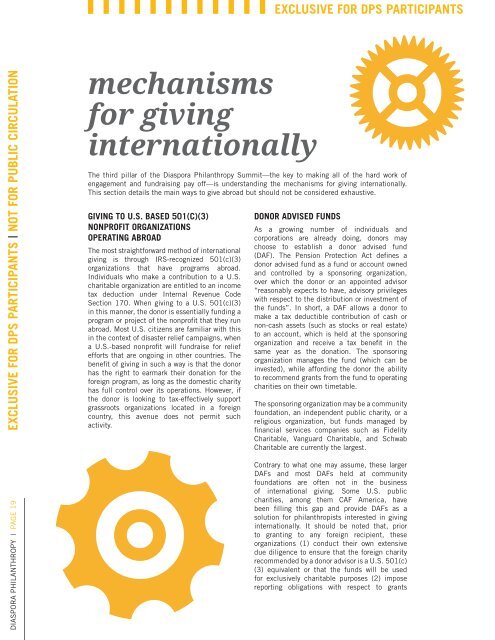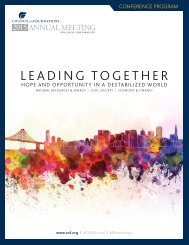DPS_Report18_v5
Create successful ePaper yourself
Turn your PDF publications into a flip-book with our unique Google optimized e-Paper software.
EXCLUSIVE FOR <strong>DPS</strong> PARTICIPANTS<br />
EXCLUSIVE FOR <strong>DPS</strong> PARTICIPANTS | NOT FOR PUBLIC CIRCULATION<br />
DIASPORA PHILANTHROPY | PAGE 19<br />
mechanisms<br />
for giving<br />
internationally<br />
The third pillar of the Diaspora Philanthropy Summit—the key to making all of the hard work of<br />
engagement and fundraising pay off—is understanding the mechanisms for giving internationally.<br />
This section details the main ways to give abroad but should not be considered exhaustive.<br />
GIVING TO U.S. BASED 501(C)(3)<br />
NONPROFIT ORGANIZATIONS<br />
OPERATING ABROAD<br />
The most straightforward method of international<br />
giving is through IRS-recognized 501(c)(3)<br />
organizations that have programs abroad.<br />
Individuals who make a contribution to a U.S.<br />
charitable organization are entitled to an income<br />
tax deduction under Internal Revenue Code<br />
Section 170. When giving to a U.S. 501(c)(3)<br />
in this manner, the donor is essentially funding a<br />
program or project of the nonprofit that they run<br />
abroad. Most U.S. citizens are familiar with this<br />
in the context of disaster relief campaigns, when<br />
a U.S.-based nonprofit will fundraise for relief<br />
efforts that are ongoing in other countries. The<br />
benefit of giving in such a way is that the donor<br />
has the right to earmark their donation for the<br />
foreign program, as long as the domestic charity<br />
has full control over its operations. However, if<br />
the donor is looking to tax-effectively support<br />
grassroots organizations located in a foreign<br />
country, this avenue does not permit such<br />
activity.<br />
DONOR ADVISED FUNDS<br />
As a growing number of individuals and<br />
corporations are already doing, donors may<br />
choose to establish a donor advised fund<br />
(DAF). The Pension Protection Act defines a<br />
donor advised fund as a fund or account owned<br />
and controlled by a sponsoring organization,<br />
over which the donor or an appointed advisor<br />
“reasonably expects to have, advisory privileges<br />
with respect to the distribution or investment of<br />
the funds”. In short, a DAF allows a donor to<br />
make a tax deductible contribution of cash or<br />
non-cash assets (such as stocks or real estate)<br />
to an account, which is held at the sponsoring<br />
organization and receive a tax benefit in the<br />
same year as the donation. The sponsoring<br />
organization manages the fund (which can be<br />
invested), while affording the donor the ability<br />
to recommend grants from the fund to operating<br />
charities on their own timetable.<br />
The sponsoring organization may be a community<br />
foundation, an independent public charity, or a<br />
religious organization, but funds managed by<br />
financial services companies such as Fidelity<br />
Charitable, Vanguard Charitable, and Schwab<br />
Charitable are currently the largest.<br />
Contrary to what one may assume, these larger<br />
DAFs and most DAFs held at community<br />
foundations are often not in the business<br />
of international giving. Some U.S. public<br />
charities, among them CAF America, have<br />
been filling this gap and provide DAFs as a<br />
solution for philanthropists interested in giving<br />
internationally. It should be noted that, prior<br />
to granting to any foreign recipient, these<br />
organizations (1) conduct their own extensive<br />
due diligence to ensure that the foreign charity<br />
recommended by a donor advisor is a U.S. 501(c)<br />
(3) equivalent or that the funds will be used<br />
for exclusively charitable purposes (2) impose<br />
reporting obligations with respect to grants



